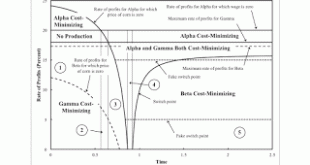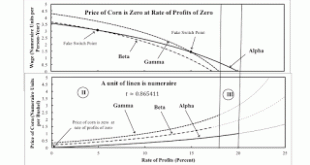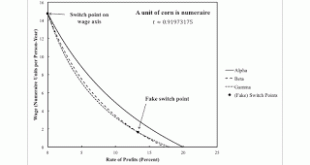I have uploaded a working paper with the post title. Abstract: This article demonstrates relationships that are transparent in Sraffa's standard system hold even when relative rates of profit vary persistently among industries. Even with such variations, total constant capital, total variable capital, total surplus value, and the rate of profits are unaltered by evaluation at labor values and at prices of production in Sraffa’s standard system. These results buttress those who see in the...
Read More »Actually Existing Socialism In A Capitalist Setting?
Elements of a post capitalist society are and have been developing in actually existing capitalism. This post points out a couple of examples. The Green Bay Packers is a community-owned (non-proper) football team in the National Football League (NFL). One can find some arguing that they are socialist. And some are concerned to refute this claim. Decades ago, some universities in the United States set up research and development organizations that then became independent, not-for-profit...
Read More »Structural Economic Dynamics and Fake Switch Points
Figure 1: A Pattern Diagram with Joint Production1.0 Introduction This post completes an example. I analyzed bits of this example here and here. This post may make no sense if you have not read a long series of previous posts or, maybe, the papers highlighted here and here. I am interested in how and if my approach to analyzing and visualizing variations in the choice of technique with technical progress extends to joint production. The example suggests fake switch points do not pose an...
Read More »Elsewhere
Here is a post from a blog devoted to cybercommunism. The blogger is glowing about Paul Cockshoot's work on refuting Hayek's supposed refutation of the possibility of a post-capitalist society. William Milberg writes about how it is becoming more common to use the word "capitalism", a word mainstream economists had mostly stopped using. Herbert Giants and Rakesh Khurana write about the corrupting effects of neoclassical economics on what is taught in business school and then practiced by...
Read More »Variation in Standard Commodity with Relative Markups
I am not sure about the economic logic in this post. Maybe somebody like D'Agata or Zambelli could do something with this. These ideas were suggested to me by email with a sometime commentator. I start out with notation for Sraffa's price system, modified in an unusual way to allow for persistent variations in the rate of profits among industries: a0 is a row vector of labor coefficients in each of n industries. A is a Leontief input-output matrix, where ai, j is the quantity of the ith...
Read More »A Fluke Case Over The Wage Axis
Figure 1: Wage Curves and The Price of Corn for the Fluke CaseIntroduction This post extends a previous post. I am basically introducing structural dynamics into an example, by Bidard and Klimovsky of fake switch points. At a rate of profits of zero in the example, the price of corn is zero for Alpha, one of the two techniques that is cost-minimizing there and for somewhat higher rates of profits. At a time before the fluke case, only the Gamma technique is cost-minimizing at a rate of...
Read More »A Pattern Over The Wage Axis In A Case Of Joint Production
Figure 1: Wage Curves with Corn as Numeraire1.0 Introduction This post presents an example of a fluke switch point in which the choice of technique cannot be analyzed by the construction of the wage frontier. Under joint production, the technique that is cost-minimizing, for a given rate of profits, does not necessarily maximize the wage. Nevertheless, one can still see what I call a pattern over the wage axis in this case. The example is a generalization of the numerical example in...
Read More »Martin Weitzman’s The Share Economy
I happen to have one book by Marty Weitzman (1942 - 2019) on my bookshelf. So I thought I would write a bit about The Share Economy: Conquering Stagflation. This is an ill-timed book. It proposes that firms negotiate with workers to pay them a percentage of revenues, instead of, say, an hourly money wage. It argues that such a change will address the widespread macroeconomic problem, throughout the 1970s, of simultaneously high unemployment and high inflation. But, by the time the book...
Read More »Elsewhere
This list is mostly a matter of aspirational reading. Maybe I want to read Ted Burczak's Socialism after Hayek. (The Amazon page has one of Herb Gintis' long reviews.) Binyamin Appelbaum's The Economists' Hour: False Prophets, Free Markets, and the Fracture of Society is not even out yet, and already some mainstream economists are whining about it on twitter. William R. Clark and Vincent Arel-Bundock have a paper, Independent but not indifferent: Partisan bias in monetary policy at the...
Read More »Mass Publics Apathetic About Democratic Norms?
This post gestures to a worrisome argument that could be constructed by combining arguments from certain references. It is also more about current events than most posts on this blog. Philip Converse's argument that most members of the mass public are ideologically innocent has long been influential among political scientists. Why should those who have families to raise, bills to pay, and jobs to take up their time pay much attention to the details of politics? Barber and Pope (2018)...
Read More » Robert Vienneau: Thoughts Economics
Robert Vienneau: Thoughts Economics



